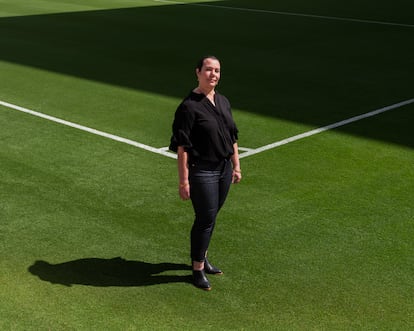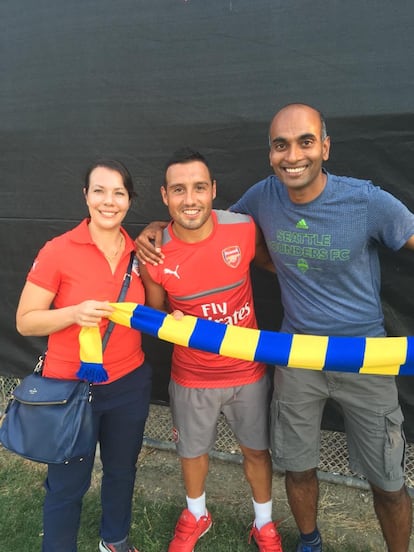The woman who uses big data to help win soccer games
Twelve years ago, Sarah Rudd created a model to evaluate players’ performance using data analysis. She is considered a pioneer in a discipline that has been fully integrated into clubs

“Have you read Moneyball?” Adrian Hanauer, then owner of the Major League Soccer (MLS) team the Seattle Sounders, asked Sarah Rudd, a young researcher from Massachusetts. At the time, she was pursuing a master’s degree in business and looking for a job in soccer. The book tells the story of how Billy Beane, the manager of the Oakland Athletics baseball team, successfully used big data to build a winning team in the 2002 season despite economic tribulations. Although Beane’s story has already become the model, it took many years for the use of these metrics to become the norm in the sport. When Rudd started working as a data analyst in 2011, this discipline was still unknown in soccer. Today it is an essential part of the big clubs and national teams. Rudd’s work at the time was groundbreaking.
But this is not a story of someone who started from nothing and made it to the top. At the time, Sarah had already graduated from Columbia University with a degree in computer science and landed a position at Microsoft as a software engineer.

“It was Adrian Hanauer who first gave me the idea of mixing statistics and soccer,” Sarah explains via video call from her home in Houston, Texas. Despite having no place in soccer at the time, the use of numbers to make strategic decisions had a history. It can be traced back to the 1940s, when American engineer Earnshaw Cook published a series of statistical studies on player performance in baseball. Decades passed in which the data remained only theoretical. It took baseball’s Billy Beane and then soccer’s Kevin Kelley (the Pulaski Academy varsity coach who innovated the use of statistics) to be taken seriously.
Rudd began reading everything she could find on the subject and created a blog in which she published her own analyses. The perfect opportunity to demonstrate her ability came when StatDNA, a company whose business is selling its analysis services to sports teams, held an open competition in which it made its database available for interested parties to develop new studies. Rudd developed an evaluation model for the soccer players’ actions, such as passes or shots on goal. Her model impressed StatDNA and she got a position there in 2011.
At the company, she learned all about how numbers could be put to real use in soccer. The work involves a complex relationship between mathematics and sports, between soccer knowledge and software, in which one must, in her words, “convert the metrics into a soccer concept.” A data analyst must understand the game, as well as the difference between the various leagues and the styles of play employed in them. “If a player comes from another system, they must learn how to transfer their performance to the soccer club that signed them,” she says. “The most important thing is recruitment. With the performance data you analyze the players and identify those who will complement the squad,” she says in fluent Spanish.

In 2012, a year after Sarah joined StatDNA, the company was purchased by Arsenal FC. The English Premier League team wanted to develop a powerful data analysis system. That was, according to Sarah, “something new for everyone. Now you say xG [calculation of expected goals] and people know what it is, but back then they didn’t and we had to work hard. Naturally, if you don’t understand something, you’re not going to trust it,” she says. There were constant arguments about what the numbers meant, but Rudd stresses that the data team had a very good relationship with the then coach Arsène Wenger, and that allowed them to move forward with their projects.
Rudd spent nine seasons with Arsenal and became the team’s director of analytics and software development. She did this while working from Houston, only going to England four times a year. She believes that the results of her work are still there and still relevant. “Our models contributed a lot. Ten years ago, there simply weren’t complete player profiles like there are now,” she insists.
In 2021 she left Arsenal. “I wanted to seek out new experiences after having learned everything there is to learn on a team,” she says. Despite the difficulties — she laughingly confesses that distrust arose more because she was an American than because she was a woman — she remembers that stage of her career with appreciation. She is especially pleased with what they achieved with Arsenal’s youth academy, which produced players such as Bukayo Saka— currently the North London club’s franchise player and an England international — during her time at the club.
Twelve years after Sarah Rudd started working on ways to apply data in the world of soccer, FIFA was reportedly showing elaborate new big data statistics live during World Cup matches in Qatar. Who is responsible for that? Her former colleague Arsène Wenger, now the federation’s director of global soccer development. Data was a topic of conversation during the tournament. For example, Luis Enrique’s Spanish national team bragged about how its big data team performed in-depth analysis to hone the best strategy. After her time at Arsenal, Rudd was looking to apply her knowledge to a smaller team. So, she had a brief stint with Blue Crow Sports, a company that worked with Club Deportivo Leganés. The experience there was negative: “There were some good things, but it wasn’t what I wanted.” In September 2022, she and her husband and business partner, Ravi Ramineni, announced their departure on Twitter without giving further details. “I was lucky to get out of there fast,” she says.

Later that year, she founded SRC ftbl with Ramineni and her colleague Cole Grossman to sell her services to soccer teams that are beginning to implement data analytics in their systems. They recently announced their new alliance with Houston Dynamo and are already finalizing deals with undisclosed others. After spending a decade working in European soccer, she is excited to begin a new chapter with the American MLS.
Rudd believes there is still much to learn about the use of data in soccer. She believes that the development of artificial intelligence and machine learning will be very positive for the discipline, which in the last decade has undergone a dizzying evolution and now represents an industry valued at least $4 billion (about €3.7 billion), according to Forbes. Although her work was groundbreaking, Rudd says she cringes when she hears herself referred to as a pioneer. “I still feel like just a Microsoft engineer.”
Sign up for our weekly newsletter to get more English-language news coverage from EL PAÍS USA Edition
Tu suscripción se está usando en otro dispositivo
¿Quieres añadir otro usuario a tu suscripción?
Si continúas leyendo en este dispositivo, no se podrá leer en el otro.
FlechaTu suscripción se está usando en otro dispositivo y solo puedes acceder a EL PAÍS desde un dispositivo a la vez.
Si quieres compartir tu cuenta, cambia tu suscripción a la modalidad Premium, así podrás añadir otro usuario. Cada uno accederá con su propia cuenta de email, lo que os permitirá personalizar vuestra experiencia en EL PAÍS.
¿Tienes una suscripción de empresa? Accede aquí para contratar más cuentas.
En el caso de no saber quién está usando tu cuenta, te recomendamos cambiar tu contraseña aquí.
Si decides continuar compartiendo tu cuenta, este mensaje se mostrará en tu dispositivo y en el de la otra persona que está usando tu cuenta de forma indefinida, afectando a tu experiencia de lectura. Puedes consultar aquí los términos y condiciones de la suscripción digital.









































